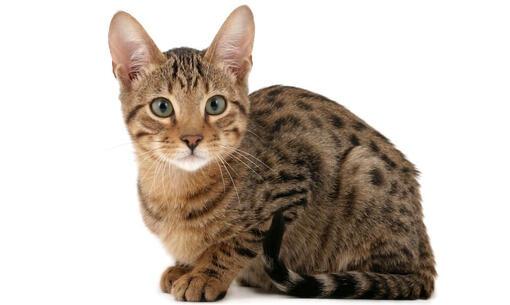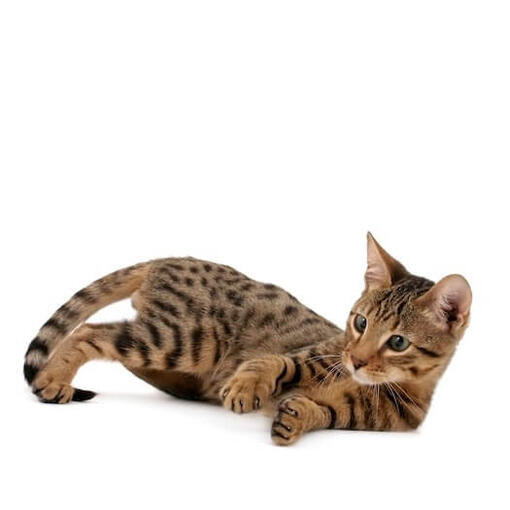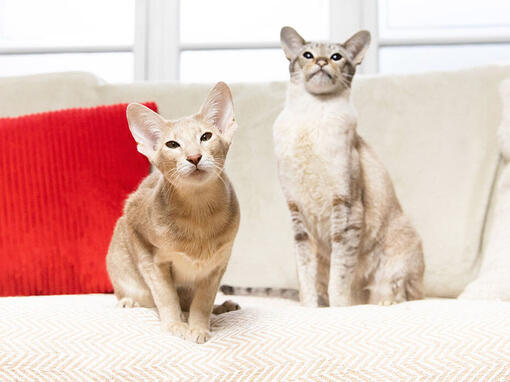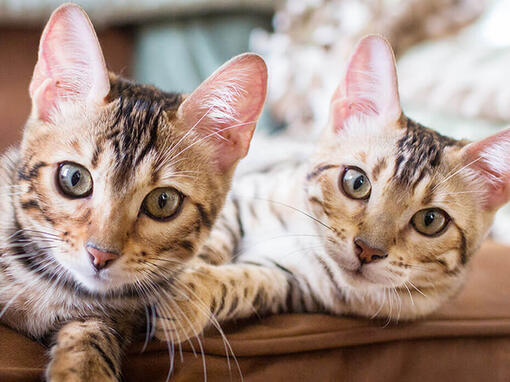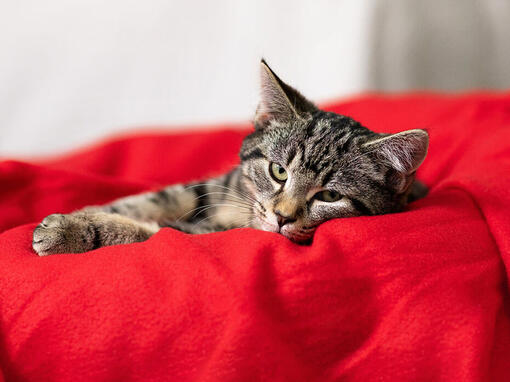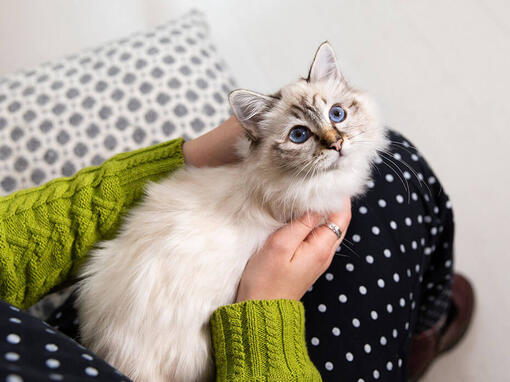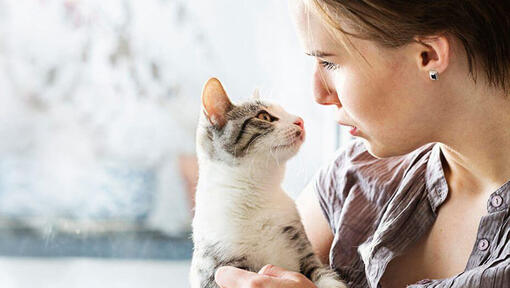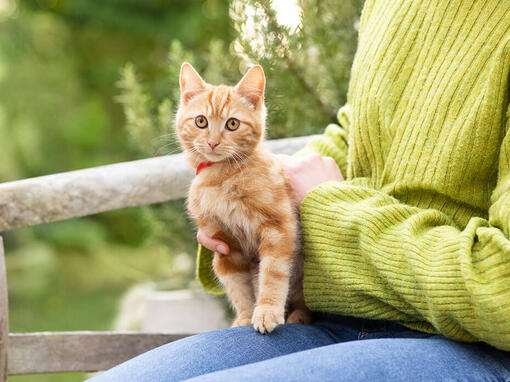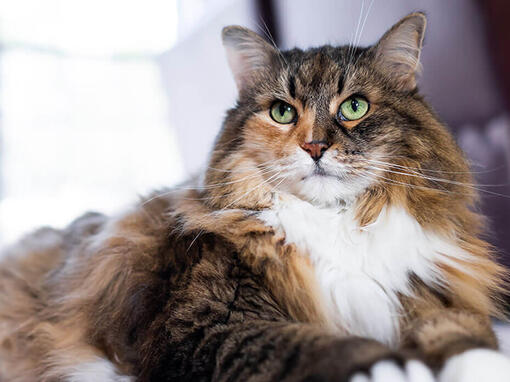- Playful and curious cat
- Sociable and dependent cat
- Very talkative cat
- Average build cat breed
- Requires grooming once a week
- Non hypoallergenic breed
- Needs some out-door space
- Great family cat
- help
Generally healthy breed
The Serengeti cat is generally healthy, with no breed-specific issues currently recognised, given the fact that they are rare and relatively new.
However, like with all cats, it’s important to provide them with a balanced diet, regular check-ups, and an active lifestyle to ensure that they remain in good health. Make sure they’re being monitored for common feline issues like dental disease, obesity, and kidney problems.
Serengeti Cat Appearance
The Serengeti cat size is medium, with long legs and a graceful, muscular build. Their ears are generally large and round, contributing to their alert and curious expression. The eyes are often in shades of gold or amber, adding to their exotic look. Their coats can be short, dense, and soft to the touch, showcasing their signature spotted pattern reminiscent of wildcats.
Serengeti Cat Personality
The Serengeti cat personality is highly social and they tend to form strong bonds with their human companions. You’ll often find them being very active, jumping, climbing, and exploring their surroundings. Also, despite their wild appearance, Serengeti cats can be very affectionate and gently, making them great companions for anyone.
Vet Rating
| Family-friendly: | 5/5 |
| Playfulness: | 4/5 |
| Intelligence: | 4/5 |
| Tendency to Vocalise: | 4/5 |
| Likes other pets: | 4/5 |
| Grooming needs: | 2/5 |
| Shedding: | 3/5 |
The Serengeti cat breed was developed in the mid 1990s by Karen Sausman, a breeder based in California who bred an Oriental Shorthair and a Bengal to achieve this breed. The goal was to create a domestic cat that looked like the wild Serval without introducing any wild genes into the breeding program. The Serengeti breed is still relatively rare but has been steadily gaining popularity among cat enthusiasts.
As with all cats, Serengeti cats are best suited for indoor living, where they can be kept safe from potentially dangerous things like traffic, predators, or diseases. However, it would be ideal if they could have access to an enclosed backyard where they could explore and be active. If they do spend more time indoors, make sure to keep them mentally and physically stimulated by providing them with games, toys or cat trees in order to help satisfy their natural instincts.
Given their active nature, Serengeti cats thrive in environments where they can climb, jump, and play. They will also appreciate quality time with their humans, as they are very social animals that could develop behavioural issues if they become bored or lonely.
If, however, you’d need to leave the home for longer periods of time during the day, it would be best to consider getting another cat to keep them company, always making sure they are properly introduced and get along well, as Serengeti cats can be territorial and like hierarchy.
It’s important to provide the Serengeti cat with a balanced diet that will help maintain their health and vitality. High-quality commercial cat food should meet their nutritional needs, and fresh water should be available at all times. Treats can also be given, but it’s best to do so in moderation in order to prevent cat obesity.
Serengeti cats are relatively low maintenance given their short and dense coats. Weekly grooming will help remove loose hair and keep them looking shiny and healthy. They are also generally good at grooming themselves, but make sure to regularly check their ears, eyes, and teeth. Nail trimming should be done regularly too to prevent overgrowth and potential injuries.
Serengeti cats are well-suited to family life, especially in homes where they can benefit from plenty of interaction and attention. Their social and playful nature make them great companions for active households and they can get along great with kids, as long as there are introduced properly.
If you’re thinking about getting a Serengeti Cat, we encourage you to consider adopting one as there are many out there in need of a loving home. You can look for a Serengeti Cat for adoption on the Wamiz website.
-
Despite their wild appearance, Serengeti cats are 100% domesticated and have no wild genes.
-
Serengeti cats can be quite chatty and can often engage in vocal conversations with their owners.
-
They got their name from the Serengeti National Park in Tanzania.
-
They are known for their impressive jumping abilities and can leap to over 2m.
What is a Serengeti cat?
The Serengeti cat is a domestic breed created to resemble the wild African Serval. They have a strikingly exotic appearance but no wildcat genes. Known for their agility, playful nature, and social personality, Serengeti cats can make great family pets.
Are Serengeti cats hypoallergenic?
No, Serengeti cats are not considered hypoallergenic. They shed a moderate amount and can trigger allergies in sensitive individuals.
How active are Serengeti cats?
Serengeti cats are very active and require plenty of physical and mental stimulation. They will thrive in an environment where they can climb, jump, or play.
Can Serengeti cats be left alone for long periods of time?
It’s recommended not to leave a Serengeti cat along for a long period of time since they can quickly become lonely or bored. It’s best to consider getting another cat to keep them company if you have a busy lifestyle.
